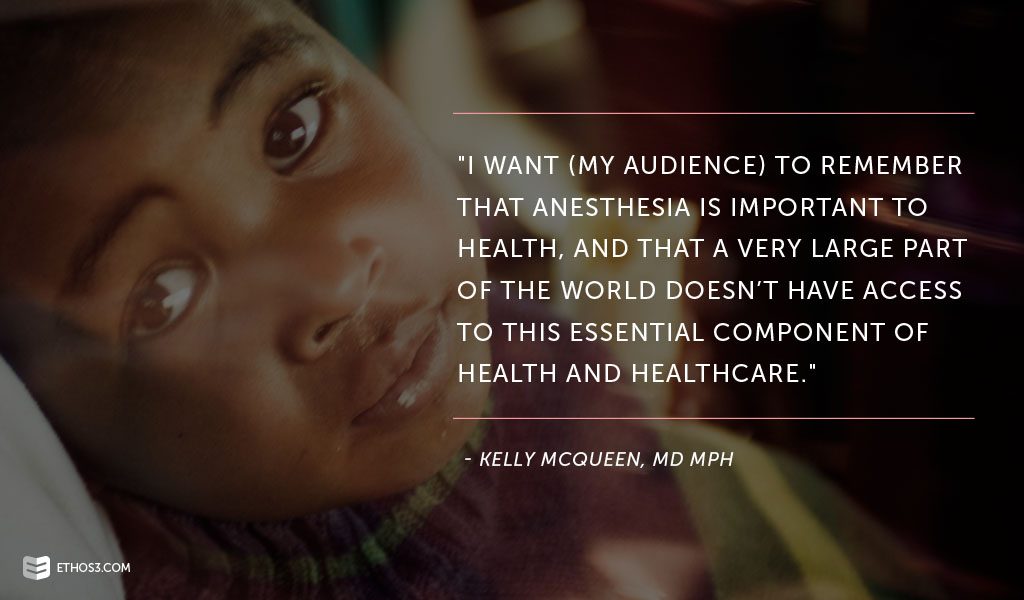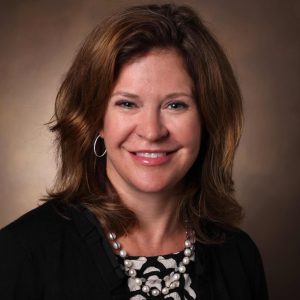In August, I had the opportunity to attend my first TED event. The Nashville chapter held their first HealthNext speaking topic, which invited professionals to speak about their causes and solutions for health issues around the world. One speaker who really stood out to me was Kelly McQueen, MD MPH. Her TED talk focused on the global anesthesia crisis. My father is a nurse anesthetist and works with patients everyday for surgeries. Since I already had an understanding of the field, I was blown away by the experiences McQueen had while working in impoverished parts of the world. Her stories were heartbreaking and the desperate need to access to this medicine and healthcare seemed overwhelming. But McQueen’s passion to spread this message was enough to fill the room with hope.
I had a chance to talk with Kelly McQueen over the phone about her impactful TEDx talk.
E3: I went to the TEDXNashville HealthNext event and I thought that your speech was really impactful. Unfortunately, you had to see some very heartbreaking experiences but the fact that you decided to take that and tell your story, I thought that was really powerful. So how did you get involved with TEDx?
KM: Thank you, I appreciate your feedback on it. I was nominated by a colleague through the official TEDx nomination process. That process was reviewed by the executive board of TEDx and then I was interviewed by the TEDx staff, but I had always wanted to give a TED talk in general. I always thought that TED would be a great way to share my story which relates to the bigger story of the global anesthesia crisis. So I had been hoping to get involved, and then the TEDxNashville venue offered me the right opportunity at the right time.
E3: What was the main motivation? What made you decide you really want to give a TED talk one day?
KM: I think TED is an especially compelling way to share stories and to share information that you want the average person to receive. You want it to be delivered in a way that is short and sweet, that is attractive in the way in the way that it’s formatted, and that’s it’s also meant for the lay public. In my consumption of TED talks, I’ve always been really inspired by the way they were delivered and I was very motivated to try and get the global anesthesia crisis within the formatting of a TED talk somewhere, somehow. When I started to become interested in this, I didn’t really know what story would be the right now to share related to global anesthesia, and honestly I think there were a lot of them that I could have shared. But the one that I did share was just the one that bubbled to the top at the moment.
E3: That story was really impactful because you described that experience so vividly that it put the visual in my head of what that must have looked like, what that must have felt like. I think you did a really great job telling that story.
KM: Thank you.
E3: Have you done a lot of public speaking before or was this your first big stage moment?
KM: I’ve done a lot of academic public speaking in the past. I think that’s very different than the style of speaking that you need to do for TED. So I’ve only done a few things that are similar to TED in the past. I made some advocacy videos for the American Society of Anesthesiologists which is my big society. I also made some videos related to physician advocacy within political campaigns. So I had a couple big stage experiences before but TED was definitely the most formative.
E3: Great. I’m glad to hear you’ve had that opportunity to branch out and do something you’re really excited about. What were the biggest challenges for this particular TED talk?
KM: I think that preparing for a TED talk, in general, if you’re an academic speaker has a lot of challenges. And I found this out right away because, of course, your audience is entirely different for the audience you are usually prepared to speak to within an academic setting. I really had to face that initially. How was I going to get this information across in an interesting way that wasn’t overly scientific and would exclude listeners? The other challenge I think was to put it in the typical TED format. When you watch a lot of TED talks there’s obviously the style that TED likes and I found that’s a style that’s more successful than others. When I look at TED talks that I love watching, most people were able to comfortably tell a story that you could tell was meaningful to them. Rather than just giving information that maybe wasn’t emotional or connected to them personally. So those were my biggest challenges.

E3: As far as goals that you wanted to accomplish, was there something you want your audience to walk away remembering?
KM: There were a few things that I wanted them to walk away remembering. I want them to remember that anesthesia is important to health, and that a very large part of the world doesn’t have access to this essential component of health and healthcare. So for me, this was really an opportunity to do some advocacy for this global health problem. I hope that eventually a lot of people will watch it and will feel like, wow this is a global health issue that I have never heard of before and I think it really needs more notice and more funding.
E3: The numbers that you gave, saying how many anesthesiologists there are per country in parts of the world. Those were really shocking. Because if one anesthesiologist unfortunately passes away or moves, an entire county could be without one.
KM: That’s right, that’s right. I’m glad that resonated with you because I think it’s sort of hard to put your head around how many do you need and how many is too few. Certainly people get the idea that if you only have one in a million, that’s way too few. But what’s a more appropriate number?
E3: Right. So to wrap things up, what’s next you or your story?
KM: The global anesthesia crisis is a story that I often share. But this was really the first time that I shared it with the lay public and that I shared it in such a personal way. And while I would certainly welcome the opportunity to talk about it personally again, I think that most of my opportunities in my work will probably be more on the professional side. My standard presentations would be more of an academic or a medical presentation. The same content, but people would be really looking at the solutions in more detail. So I would love to tell the story again in a more intimate way but I can’t really imagine where that would be at this point.
E3: Well I wish you the best of luck out there sharing your story and your message.

